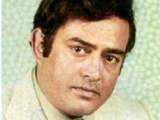Sanjeev Kumar – the most versatile actor of bollywood.
By: Souvik Chatterji.
Sanjeev Kumar can be considered as one of the most versatile actors who had glorified bollywood with his depth of understanding characters and dynamic performance in numerous films in Bollywood. Harihar Zariwala, better known as Sanjeev Kumar, was born on 9th July, 1938, and made his debut in the film Hum Hindustani in 1960, but got his role as a hero in the film Nishan in 1966.
As the directors and producers of the 60s and 70s, recognised the supreme calibre of Sanjeev Kumar in understanding the emotions of different characters from the depth of his heart, they started casting him in experimental roles. He acted in the role of an insane person in the film Khilona, 1970, opposite Mumtaz and got critics acclamation. His lips in Rafi's song titled "khilona", was well appreciated by music lovers. In Parichay, 1972, he acted in the role of classical singer who was rebuked by his father Pran (an industrialist) and to leave his house to create separate identity. Neither his wife was accepted his father, nor could he appreciate the musical skills of his sons, according to whom music was a substandard professions only practiced by tawaifs in kothas. Sanjeev Kumar contracted incurable disease and died leaving 5 children including Jaya Bacchan, the eldest of them and Master Raju, the youngest, who were brought back by Pran and reformed by Jeetender the compassionate teacher who felt the pains in the minds of these children who required love and not over strictness displayed by Pran. Sanjeev Kumar gave supreme lips in Bhupinder Singh's songs "Mitwa" and "beeti na bitai raina". The audience were in tears to see Sanjeev Kumar shedding blood while singing as he coughed out to death. Brilliant performances in each and every film of Gulzar made Sanjeev Kumar, the greatest actor of his generation.
He received the national award for the best actor in 1971, for his natural performance in the film Dastak, 1971, which was based on the pains of young couple who could not find a reasonable accommodation in the city of Mumbai, and went on searching them from one place to another which was a burning problem in those days and still remains a big concern today. He received his second national award in Gulzar's film Koshish, in 1973, which was based on deaf and dumb subject. He himself was deaf and dumb and learnt to use sign language taught in deaf and dumb schools and taught Jaya Bacchan, who was also deaf and dumb to express herself with those signs. He did not have any dialogue in the film. There were so many soft emotions in the film, once Dina Pathak asked Sanjeev Kumar to tell his name which was haricharan, he just took a chilli and put it on her foot, as chilly is green meaning hari and feet resembles charan. At the same time he showed his sense of humour in Ramesh Sippy's Seeta aur Geeta, 1972, opposite Hema Malini.
In 1975, Sanjeev Kumar, acted in the role of his lifetime in the film Sholay, where he played the role of a zamindar of a village in north India, who retired as a police officer and faced the challenge of dacoits in the Chambal region with a 2 man army of Amitabh Bacchan and Dharmender who were offenders themselves. The film was based on real life incidents and Ramesh Sippy's blockbuster remains India's most debated film of the millennium. He brought entire expression of horrified soul when Amzad Khan severed his two hands by giving a horrified look. The same expression was displayed at the end of the film when he deformed the hands of Amzad Khan, bringing all the feelings of revenge against a group of dacoits who killed everyone in his family and horrified the villagers with their tyranny. Sanjeev Kumar won the film fare award in the same year with his performance in the film Aandhi opposite Suchitra Sen. He was also nominated for the best actor award for his serene performance in the film Mausam opposite sharmila Tagore, in the same year, where his reflections in the song "dil dhoonta hai phir wohi fursat ke raat din" sung by Bhupinder Singh still haunts film lovers.
He also won best actor award for the film Arjun Pandit, in 1976, where he was the compounder of a village doctor and gave his entire savings for the education of the son of the doctor. The pains in the role of the rural character as displayed by Bengali actor Kali Banerjee in the film Arohi directed by Tapan Sinha was well matched by Sanjeev Kumar's brilliant acting skills.
The list of outstanding performance of Sanjjev Kumar, include Shikar, 1968, Satyakam, Alaap, etc., and it can go on as he was seen in almost every alternate film made at that time. If Om Puri and Naseeruddin Shah depict realistic acting after specialising in acting with experience of learning performing arts in acting schools and schools of drama, Sanjeev Kumar belong to a unique gharana where no training is given in respect of perceiving the feelings of human beings through the senses and displaying them with expressions. He films should be restored for immense filmic value.
Similar articles are available in http://stationhollywood.blogspot.com






comment:
p_commentcount